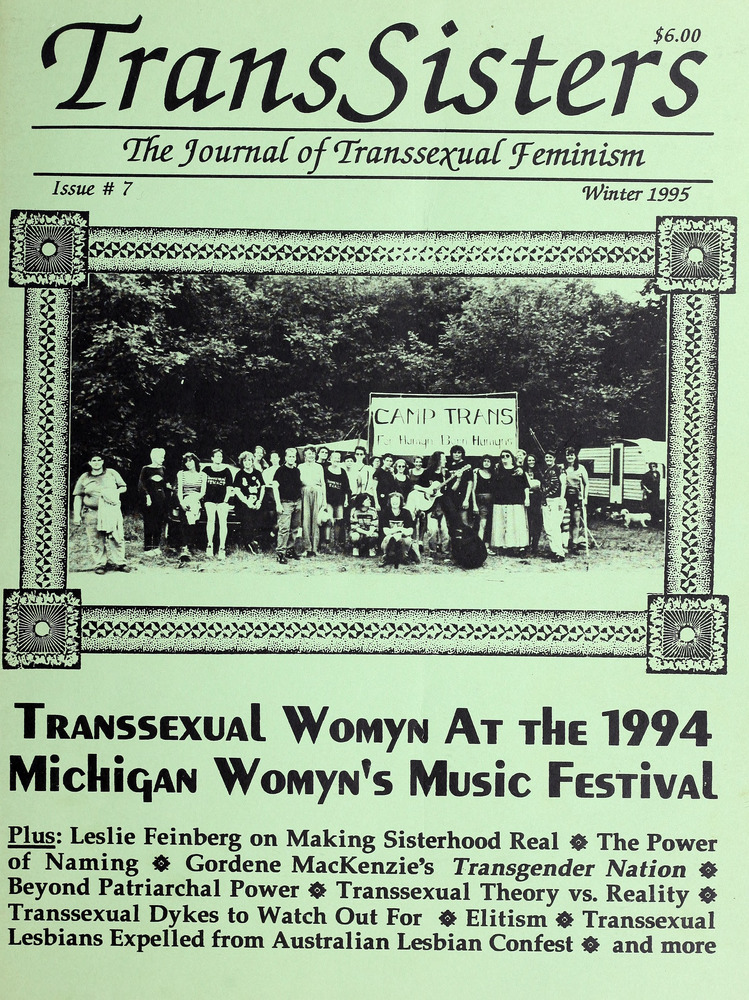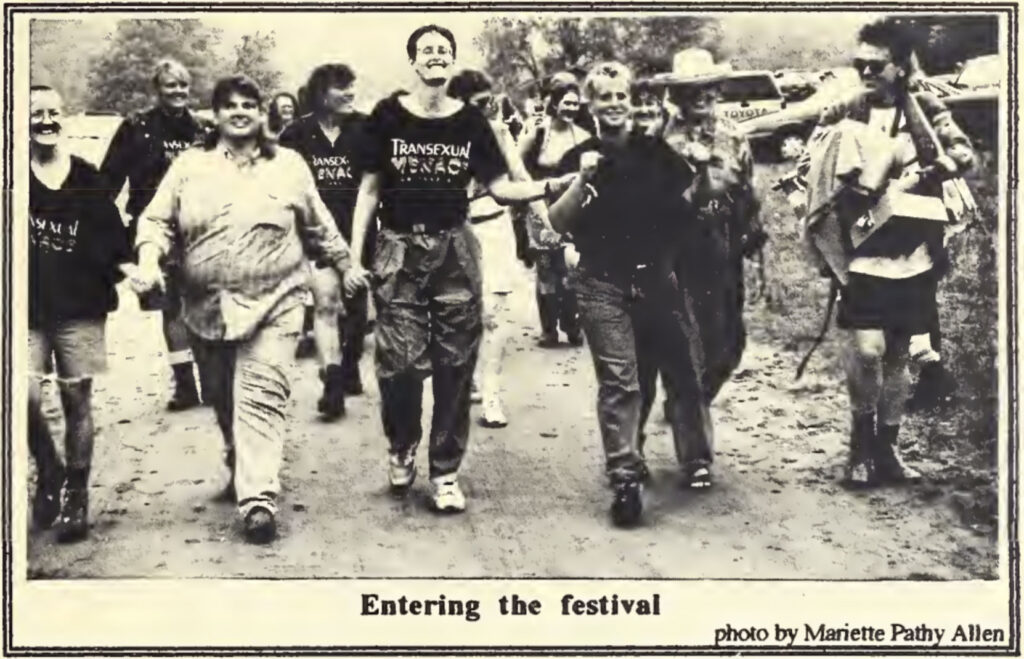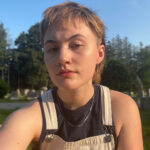Ocean Ouillette
In 1994, a troop of non-trans lesbians escorted a group of trans people as they marched into the Michigan Womyn’s Music Festival, an important instance in which trans folks were visibly supported by lesbians. The Michigan Womyn’s Music Festival (MWMF or MichFest) was a largely lesbian, “women only” space that began in 1976 and ran annually until 2015. The Festival is well-known for its 1991 expulsion of Nancy Burkholder — a transsexual* lesbian woman — for violating the Festival’s trans-exclusionary “womyn-born womyn” only policy. Many of the dominating narratives, including the story of Burkholder’s removal from MichFest, fixate on the divide between trans and non-trans lesbians. Less commonly discussed is the rich history of affinity and solidarity between trans and non-trans lesbians, epitomized by the coalition of the two groups at the 1994 Michigan Womyn’s Music Festival.

Even before 1994 MichFest, many of the festival attendees were deeply supportive of allowing trans attendees inside. In 1992, Davina Anne Gabriel — a transsexual lesbian woman and editor of the transfeminist publication TransSisters — and her non-trans friend, Janis Walworth, conducted a survey within the festival and published the results in Issue #2 of TransSisters. Out of the 1,500 attendees of the festival, 633 participated. One of the survey’s questions was “Do you think male-to-female transsexuals [transsexual women] should be welcome at Michigan?” 73.1% said yes. The same year, Gabriel disclosed that she was transsexual to a group of approximately twenty women who were participating in a workshop at MichFest. Gabriel wrote in Issue #2 of TransSisters that, with the exception of two participants, “[the women] expressed that they were very glad that I was there… and that they were very grateful for the consciousness-raising around the issue that we were doing at the festival.” Although the “womyn-born womyn” only policy remained in place, it clashed with what appeared to be the beliefs of the majority of the festival attendees.
At the 1994 Michigan Womyn’s Music Festival, the building affinity between trans and non-trans lesbians peaked. The year after Burkholder’s expulsion, a group of people began camping outside of the festival annually in protest of the “womyn-born womyn” policy. The group officially named itself “Camp Trans” in 1994 and grew to the size of what Davina Anne Gabriel described as a “small city”. Many of the 1994 festival attendees came to visit, eagerly engaging in conversation with members of Camp Trans. One of the visitors was Hillary Smith, a member of the lesbian direct action group, the Lesbian Avengers. Smith recognized Riki Anne Wilchins, another member of the organization. Wilchins inhabited both trans and lesbian identities and spaces, bridging the gap between trans and non-trans folks in the lesbian community. In Issue #7 of TransSisters, Davina Anne Gabriel recalls that Smith asked Wilchins if they were planning to attend the Lesbian Avengers meeting inside the festival grounds. Wilchins jokingly replied, “send out an escort for me.” Smith answered “okay, how many do you want?” in complete sincerity. Ultimately, Wilchins’ position as both trans and lesbian catalyzed the opportunity to show the opposition of the festival’s “womyn-born womyn” only policy and, more broadly, the solidarity between trans lesbians and non-trans lesbians.
As promised, a few days later, a contingent of Lesbian Avengers arrived to safeguard a selected group of Camp Trans members including Riki Anne Wilchins, Davina Anne Gabriel, and Leslie Feinberg, a transgender lesbian activist and author of the highly acclaimed Stone Butch Blues. Surrounded by their own personal security of Lesbian Avengers, the group approached the MichFest ticket booth. Wilchins announced that they were a group of transsexual women, non-transsexual women, a transgender person, and an intersex person and that they all felt that they were “womyn-born womyn,” but they weren’t going to say who was who. Although it was not noted by Wilchins, the group was majority white, which undoubtedly influenced their ultimate success — they were all allowed to purchase tickets. Together, they entered the festival, marching forward, united as trans folks of all sexualities, non-trans lesbians, and trans lesbians.

Inside, the group was met with the same overwhelming support that Davina Anne Gabriel had witnessed in her survey. As the Lesbian Avengers escorted the Camp Trans contingent further into festival territory, many women joined them. Gabriel reflected in the seventh issue of TransSisters,
I doubt if anyone there could not have realized that…this was not only a pivotal moment in the history of the Michigan Womyn’s Music Festival, but also in the herstory of the lesbian/feminist movement itself, and that the course of both MWMF and the lesbian/feminist community as a whole had been launched on an entirely new trajectory.
The group went to the Lesbian Avengers meeting and later Leslie Feinberg delivered a speech to a crowd of Michfest attendees outlining the vision for precisely the “new trajectory” that Gabriel had described. Feinberg’s speech ultimately called for solidarity between lesbians and trans people. The unity on display between Camp Trans and the Lesbian Avengers was a clear testament that Feinberg’s vision was achievable; the solidarity between trans folks, notably trans lesbians and non-trans lesbians, was standing right in front of them.
The Lesbian Avengers escorted the group out of MichFest and back to Camp Trans, concluding one of the earliest instances of non-trans and trans lesbian solidarity. However, it is important to note that this was not the first. In 1972, years before the Lesbian Avengers at Michfest, a group of non-trans lesbians showed solidarity with trans lesbians at Sisters Magazine, the monthly publication of the San Francisco chapter of the Daughters of Bilitis (DOB), the first lesbian civil and political rights organization of the United States. DOB itself had voted to exclude transsexuals from its organization, but the entire staff of Sisters disagreed with the organization and subsequently renounced their employment at the magazine and their membership to DOB in protest of the trans-exclusionary practice, saying, “We will have no part in the oppression of our sisters.”
Jumping ahead to October 2021, a troop of lesbians on Twitter advocated for the inclusion of trans women in lesbian spaces after Caroline Lowbridge’s article “We’re being pressured into sex by some trans women” — which uses the same trans-exclusionary rhetoric as MichFest had — was published on the BBC News website. Instances of solidarity like the Lesbian Avengers in 1994 at MichFest, the Sisters staff in 1972, and the lesbian Twitter action in 2021 are reminders that we must have “no part in the oppression of our sisters” and honor the history of solidarity between trans and non-trans lesbians (rather than fixating on trans-exclusionary narratives). We can use history as fuel to be, in the words of revolutionary transgender lesbian Leslie Feinberg, the “best fighters of each other’s oppressions” in contemporary movements.
* Although I do use “trans” as a broader umbrella term for identities such as “transgender,” I use the word “transsexual” in this post because it was the language that folks used and identified with at the time.
 Ocean Ouillette is an undergraduate English student with minors in Writing and Women’s, Gender, and Sexuality Studies at Northeastern University. They work as a Research Assistant at the Digital Transgender Archive.
Ocean Ouillette is an undergraduate English student with minors in Writing and Women’s, Gender, and Sexuality Studies at Northeastern University. They work as a Research Assistant at the Digital Transgender Archive.

NOTCHES: (re)marks on the history of sexuality is licensed under a Creative Commons Attribution-NonCommercial-NoDerivatives 4.0 International License.
Based on a work at www.notchesblog.com.
For permission to publish any NOTCHES post in whole or in part please contact the editors at NotchesBlog@gmail.com




